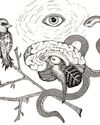
Admittedly, the idea of time travel has always given me a smirk. I suppose that is because to me it has always sounded like a fantasy that could never be actualized. Hence, entertaining the idea of its possibility felt like a waste of time. Nonetheless, as I encounter this concept more and more often these days, especially as a part of intellectual conversations and philosophical speculations, I must admit that somehow time travel keeps me wondering. My momentary contemplations, however, do not necessarily focus on whether it is practically possible to travel to a certain point in the past or in the future. Rather, they help me deep dive into the nature of time itself.
Defining time may, at first, seem quite straightforward. After all, we are all familiar with the idea of time in the sense of duration and its measurement. However, what time is in its essence is a much more difficult question, with a long history of philosophical disputes and still no agreed definition.
Our most common intuition tells us that time is a passing phenomenon. What this entails is that space (or the physical universe) is in a fixed or static position and time, like a film running through an old projector if you will, comes and passes through the universe. As time comes, it brings all the changes with it. In other words, the universe changes through time.
This story is from the {{IssueName}} edition of {{MagazineName}}.
Start your 7-day Magzter GOLD free trial to access thousands of curated premium stories, and 9,000+ magazines and newspapers.
Already a subscriber ? Sign In
This story is from the {{IssueName}} edition of {{MagazineName}}.
Start your 7-day Magzter GOLD free trial to access thousands of curated premium stories, and 9,000+ magazines and newspapers.
Already a subscriber? Sign In

Anselm (1033-1109)
Martin Jenkins recalls the being of the creator of the ontological argument.

Is Brillo Box an Illustration?
Thomas E. Wartenberg uses Warhol's work to illustrate his theory of illustration.

Why is Freedom So Important To Us?
John Shand explains why free will is basic to humanity.

The Funnel of Righteousness
Peter Worley tells us how to be right, righter, rightest.

We're as Smart as the Universe Gets
James Miles argues, among other things, that E.T. will be like Kim Kardashian, and that the real threat of advanced AI has been misunderstood.

Managing the Mind
Roger Haines contemplates how we consciously manage our minds.

lain McGilchrist's Naturalized Metaphysics
Rogério Severo looks at the brain to see the world anew.

Love & Metaphysics
Peter Graarup Westergaard explains why love is never just physical, with the aid of Donald Davidson's anomalous monism.

Mary Leaves Her Room
Nigel Hems asks, does Mary see colours differently outside her room?

From Birds To Brains
Jonathan Moens considers whether emergence can explain minds from brains.